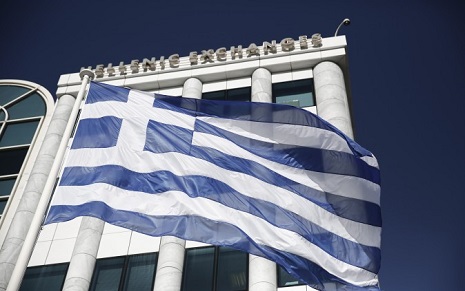On Monday night, Greece rejected a plan to extend its €240bn (£178bn) bailout.
Greek Finance Minister Yanis Varoufakis called the EU deal "absurd" and "unacceptable".
But Mr Varoufakis declared he was ready to do "whatever it takes" to reach agreement over Greece`s bailout, despite the collapse of the talks.
And he said he was prepared to agree a deal under different conditions.
The Greek stock exchange recovered some ground as the day progressed, but at midday on Tuesday in Athens, it was still 2.25% lower.
Stock exchanges across Europe all fell in morning trade before recovering.
Germany`s main index, the Dax, was 0.35% lower and France`s blue chip index, the Cac-40, down 0.19% at mid-day.
In the UK, which has less exposure to Greece`s debt woes, the FTSE 100 Index which also started the day lower, had risen 0.45% by lunchtime.
US investment bank JP Morgan claimed over the weekend that €2bn worth of deposits was flowing out of Greek banks each week and estimated that if that were to remain the case, they would run out of cash to use as collateral against new loans within 14 weeks.
JP Morgan`s estimate is based on a calculation that a maximum of €108bn of deposits is left in Greek banks.
The most up-to-date figures from the Greek central bank show deposits dropped 2.4% month-on-month in December to €160.3bn from €164.3bn, marking the third monthly fall in a row.
Deadline
Dutch Finance Minister Jeroen Dijsselbloem, who is also chairing the Eurogroup meetings of eurozone finance ministers, warned on Monday night there were just days left for talks.
Mr Dijsselbloem said it was now "up to Greece" to decide if it wanted more funding or not.
Ahead of Tuesday`s meeting, he said: "I hope they [Greece] will ask for an extension to the programme, and once they do that, we can allow flexibility, they can put in their political priorities.
"Of course, we will see whether their programme remains on track. But that is the way forward. It`s really up to the Greeks. We cannot make them or ask them. It really it really is up to them. We stand ready to work with them, also [over] the next couple of days."
Greece`s current bailout expires on 28 February. Any new agreement would need to be approved by national governments, so time is running out to reach a compromise.
Without a deal, Greece is likely to run out of money.
More about:
















































